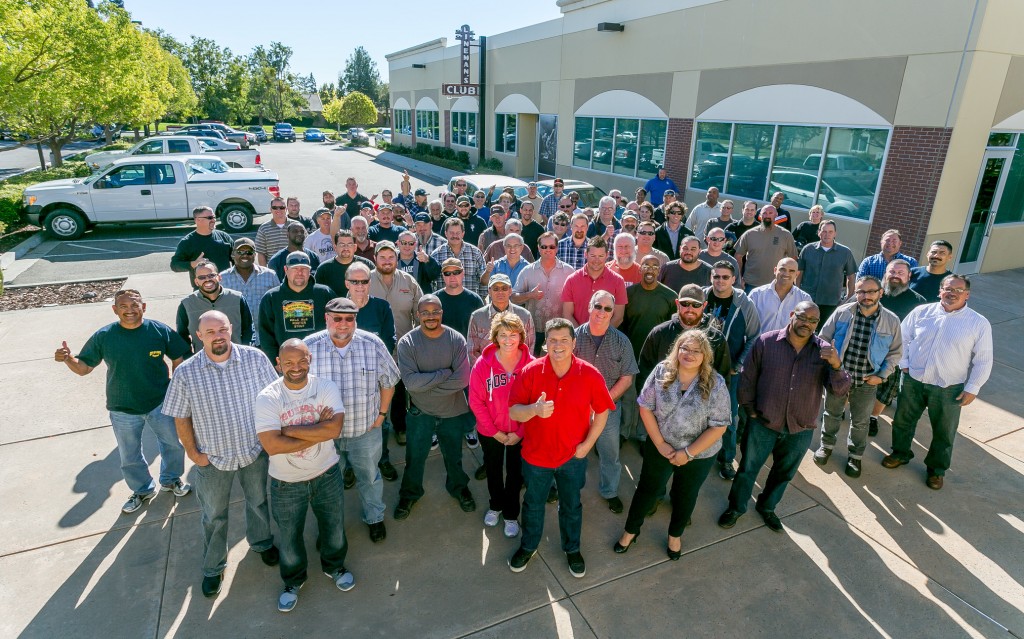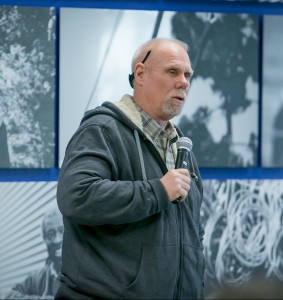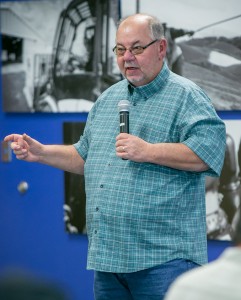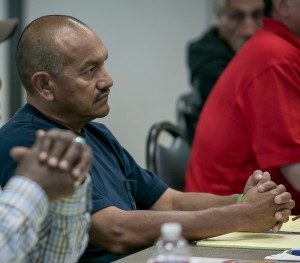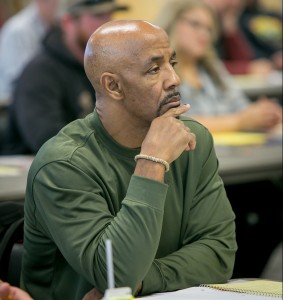More than 100 members of IBEW 1245, representing 62 different negotiating committees, came together at Weakley Hall on Nov. 4, 2015 for IBEW 1245’s biennial Negotiator Training Seminar. The training is specifically designed to help public-sector and private-sector negotiating committee members achieve the best results possible at the bargaining table.
The day-long training kicked off with a detailed overview on the role of the bargaining committee member, including responsibilities before, during and after a table agreement is reached.
“Every member isn’t always going to like or appreciate everything that happens during bargaining. That’s just the nature of the process,” said Local 1245 Senior Assistant Business Manager Dennis Seyfer at the beginning of the seminar. “But our job [as negotiators] is to think of what’s best for the membership at large, build the best product that we can at the table, take it out to our members and educate them on it.”
Business Rep Randy Osborn pointed out that bargaining is, by definition, all about give and take.
“If you show up to the table and say, ‘We aren’t going to take any concessions,’ … well guess what? That whole list of stuff that we want, those are concessions for the employer,” Osborn pointed out. “So if we come with that sort of attitude, then you better believe the employer isn’t going to want to give us anything we’re asking for.”
Assistant Business Manager Ray Thomas provided an extensive tutorial on best practices for getting to a table agreement, and underscored the importance of keeping a level head throughout the process.
“If you lose it and go overboard, bargaining will almost always be less productive, “ Thomas told the room full of negotiators. “Emotions, name-calling, finger-pointing… it doesn’t work. You can’t control what [the employer] is going to do, but you can control your reaction. We’re better off when we stay composed.”
That message rang true with seasoned negotiator Jaime Tinoco, an electric crew foreman with the City of Lompoc. He experienced the negotiations process as a non-union member for 25 years, and has seen a notable and beneficial change in the tone and effectiveness of bargaining ever since the Lompoc workers joined Local 1245 and secured their first union contract three years ago.
“[Bargaining as a Local 1245 member] has been really different,” said Tinoco, noting that IBEW’s focus on respectful behavior during negotiations cannot be overstated. “Before the union, we had a pretty bad relationship [with the employer], and everything was very negative. But our last two negotiations have been more polite, and the last round was the best negotiation that we’ve ever had with the City. Very cordial, very productive. It was like night and day.”
Like Tinoco, Todd Davis also helped to negotiate the first union contract for his workgroup. Davis, who works at Sunoptics as a group lead (a position he helped to establish in the contract and probably wouldn’t have if it wasn’t for the union), said negotiating from the union side of the table has been enlightening.
“Acuity – our parent company — is a Fortune 500 company, and I always wanted to see what the thought process of the corporate management was,” said Davis. “Being on the negotiating committee gave me the opportunity to understand what their thought process was on the highest level. So it’s been a great experience for me personally.”
“Seeing the company and the IBEW negotiate, it seemed from my vantage point, that it went pretty smoothly, and I think that had to do with Ray Thomas’ experience,” said Davis.
Thomas, a seasoned negotiator who has served on dozens of bargaining teams, lead the majority of the day-long training, sharing anecdotes, lessons learned and best practices he’s adopted over the years. He provided the rank-and-file negotiators with a detailed roadmap to a successful outcome, drawing from a variety of resources in addition to his own experience.
He also shared a few quotes from negotiations expert Chester Karrass, including this one:
“A winner in negotiation is one who understands what his or her objectives are and takes the time to achieve what is possible through the bargaining process. In addition, a winner strives to leave the other party as satisfied as possible with the outcome. Winners do this by the way they conduct themselves in negotiation and by the way they jointly search for a better deal for both sides.”
The training also included an overview of the upcoming Supreme Court case, Friedrichs vs. CTA, which has the potential to dismantle the union’s ability to bargain strong agreements and could have a serious impact on the nationwide Labor Movement as a whole. The day concluded with a presentation on the union’s peer safety program, since safety has always been a pivotal bargaining issue for IBEW members ever since the union’s inception over 100 years ago.
Photos by John Storey
